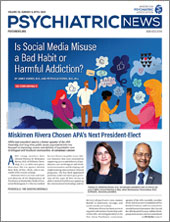Group Pushes House, Senate for More Research Funding
Abstract
Funding for biomedical research must be increased and stabilized to ensure the nation’s health and its scientific workforce, say advocates.
Several hundred participants trooped up to the Capitol Hill offices of their members of Congress on September 18 as part of the Rally for Medical Research to advocate for more funding for the National Institutes of Health (NIH). APA was one of more than 300 medical, scientific, academic, and advocacy organizations supporting the initiative.
“In spite of the unprecedented scientific opportunities that exist today, our nation’s support for medical research is in steady decline,” said William Narrow, M.D., M.P.H., associate director of APA’s Division of Research. “Since Congress completed the unprecedented doubling of the NIH budget in 2003, appropriations for the agency have remained essentially flat.”

“We want to maintain America’s position as the preeminent research nation,” said Sen. Amy Klobuchar (D-Minn.) at the Rally for Medical Research in Washington, D.C., last month.
Not only has the absolute level of federal funding for biomedical research not changed for a decade, but it has lost 20 percent of its purchasing power because of inflation. Additional across-the-board cuts during the sequestration of 2013 cut the NIH budget by $1.6 billion and led to 640 fewer research grants.
“The declining resources have blocked the careers of young scientists, threatening the future of the American research enterprise,” said Sen. Amy Klobuchar (D-Minn.) “And we want to maintain America’s position at the pre-eminent research nation.”
Other countries like China, Korea, and India are increasing their scientific and medical research while the United States is risking stagnation, she said.
Keeping its premier research status will require looking at new long-term funding mechanisms and becoming more creative with public-private partnerships, said Klobuchar. “But that is not going to replace the general science research that is funded out of NIH.” ■
More information about the Rally for Medical Research can be accessed here.



